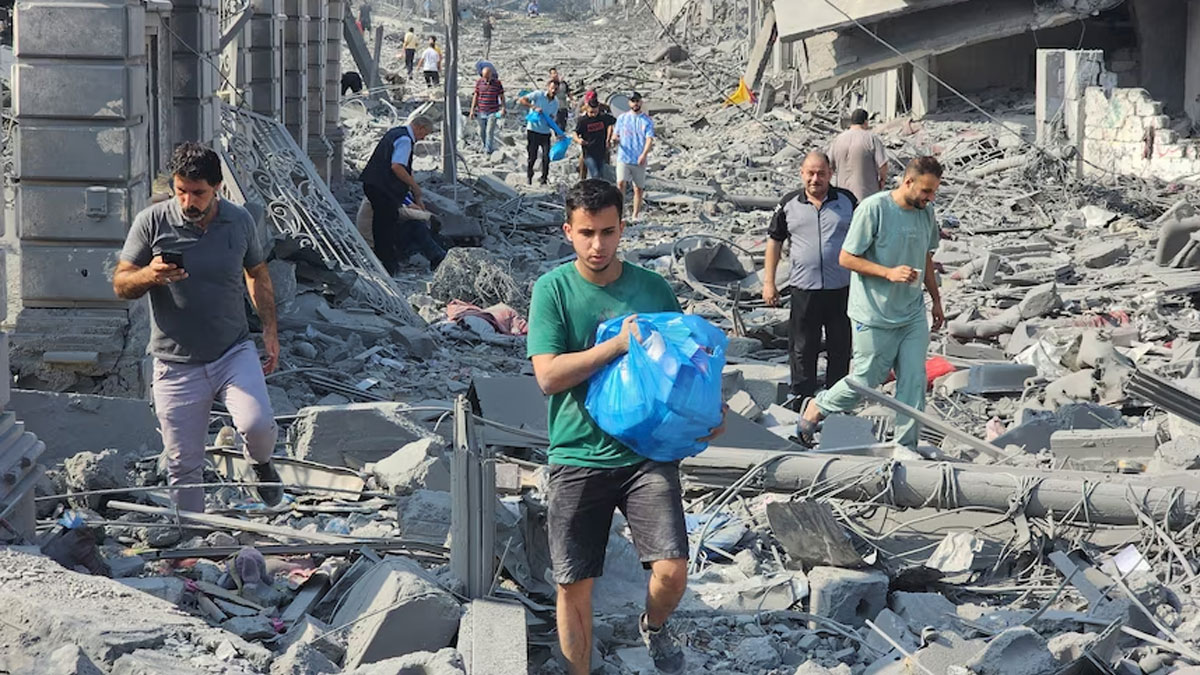
Israeli warplanes have hammered the Gaza Strip neighbourhood by neighbourhood, reducing buildings to rubble and sending people scrambling to find safety in the tiny, sealed-off territory.
As Israel vowed a retaliation against Hamas' surprise weekend attack that would "reverberate … for generations," aid organisations pleaded for the creation of humanitarian corridors to get aid into Gaza, warning that hospitals overwhelmed with wounded were running out of supplies.
Israel has stopped entry of food, fuel, and medicines into Gaza, and the sole remaining access from Egypt was shut down on Tuesday after air strikes hit near the border crossing.
A large part of Gaza City's Rimal neighbourhood was reduced to rubble after warplanes bombarded it for hours the night before.
Residents found buildings torn in half or demolished to mounds of concrete and rebar.
Cars were flattened and trees burned out on residential streets transformed into moonscapes.
Palestinian Civil Defence forces pulled Abdullah Musleh out of his basement together with 30 others after their apartment building was flattened.
"I sell toys, not missiles,'' the 46-year-old said, weeping.
"I want to leave Gaza. Why do I have to stay here? I lost my home and my job."
The Israeli military said it struck hundreds of targets in Rimal, an upscale district home to ministries of the Hamas-run government, universities, media organisations and the aid agency offices.
The devastation signalled what appeared to be a new Israeli tactic: Warning civilians to leave certain areas and then hitting those areas with unprecedented intensity.
On Tuesday afternoon, the military told residents of another nearby neighbourhood to evacuate and move into the centre of Gaza City.
"There is no safe place in Gaza right now, you see decent people being killed every day," Hasan Jabar, a Gaza journalist, said after three other Palestinian journalists were killed in the Rimal bombardment.
"I am genuinely afraid for my life."
Almost 2,000 killed since Hamas attack
The war, which has already claimed at least 1,800 lives on both sides, is only expected to escalate.
The weekend attack that Hamas said was retribution for worsening Palestinian suffering under Israeli occupation has fired Israel's determination to crush the group's hold in Gaza — raising risks of an expanded regional conflict.
Hamas militants stormed into Israel on Saturday morning, slaying hundreds of residents in homes and streets near the Gaza border and bringing gun battles to Israeli towns for the first time in decades.
In the Gaza Strip, 900 people have been killed, including 260 children and 230 women, along with 4,600 wounded since Saturday, according to the local health ministry.
Israel's embassy in Washington said the death toll from the weekend Hamas attacks had surpassed 1,000.
The victims were overwhelmingly civilians, gunned down in homes, on streets or at an outdoor dance party.
Scores of Israelis and some foreigners were captured and taken to Gaza as hostages, some paraded through the streets.
Hamas and other militant groups in Gaza hold about 150 soldiers and civilians hostage, according to Israel.
Israeli defence minister says offensive will 'intensify'
On Israel's northern border, a salvo of rockets was fired from southern Lebanon towards Israel, prompting Israeli shelling in return, three security sources told Reuters.
A Lebanese security official said six rockets were fired from southern Lebanon into northern Israel on Tuesday evening.
The officials said it was not immediately clear who fired the rockets from the area around the southern village of Qlaileh.
A statement from UNIFIL, the UN peacekeeping force in south Lebanon, also confirmed the rocket fire and urged "everyone to exercise restraint at this critical time".
Officials from the Hezbollah militant group did not immediately respond to requests for comment, while spokespeople with Hamas and the Palestinian Islamic Jihad said they had no information on the rockets.
The firing of rockets came a day after three Hezbollah fighters and an Israeli army officer were killed along the border.
On Tuesday afternoon, Hamas fired barrages of rockets toward the southern Israeli city of Ashkelon and Tel Aviv.
There were no immediate reports of casualties.
Israel's military said on Tuesday that a number of shells had been launched from Syrian territory towards Israel, and that some landed in open areas in Israeli territory.
The military did not provide details.
There were no reports of damage or injuries.
Israeli Defence Minister Yoav Gallant, speaking to soldiers near the Gaza fence, said: "Hamas wanted a change and it will get one. What was in Gaza will no longer be."
"We started the offensive from the air, later on we will also come from the ground.
"We've been controlling the area since day two and we are on the offensive. It will only intensify."
In Gaza, more than 187,000 people have fled their homes, the UN said, the most since a 2014 air and ground offensive by Israel uprooted about 400,000.
Aid organisations plead for corridor
On Monday, Israel announced a "complete siege" on the territory, halting deliveries of food, fuel, water, medicines, electricity and other supplies. That left the only access in and out through the now-closed Rafah crossing.
Egyptian officials were talking with Israel and the US, pushing to set up humanitarian corridors in Gaza to deliver aid, an Egyptian official said.
The Egyptian Red Crescent managed to get in one shipment of medical supplies to the besieged city before the border closed.
There were negotiations with the Israelis to declare the area around the Rafah crossing between Egypt and Gaza as a "no fire zone", the official said.
The World Health Organization echoed the call for humanitarian corridors.
It said that supplies it had pre-positioned for seven hospitals in Gaza have already run out amid the flood of wounded.
"With the number of casualties currently coming in, these hospitals are now running beyond their capacity," a WHO spokesman said.
The head of the medical aid group Doctors Without Borders said surgical equipment, antibiotics, fuel and other supplies were running out at two hospitals it runs in Gaza as well.
By ABC/wires
Original article link: https://www.abc.net.au/news/2023-10-11/israeli-planes-hammer-gaza-death-toll-humanitarian-corridor/102961492
Stay tuned for the latest news on our radio stations


